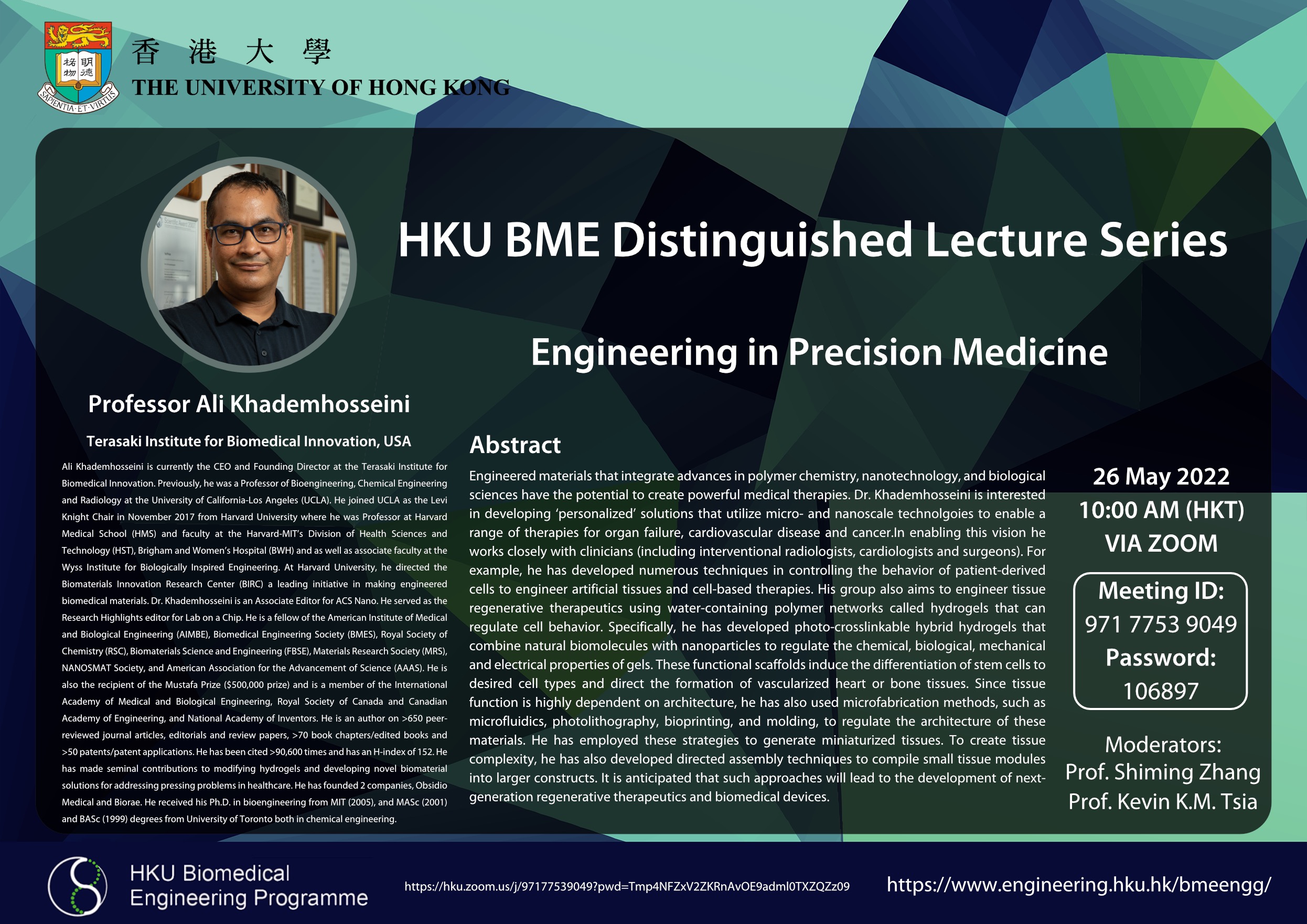HKU BME Distinguished Lecture Series: Professor Ali Khademhosseini “Engineering in Precision Medicine” (May 26, 2022)
Professor Ali Khademhosseini from the Terasaki Institute for Biomedical Innovation, USA will deliver a lecture entitled “Engineering in Precision Medicine” via zoom on May 26, 2022 (Thursday). Details as follow:
Time: 10am (HKT)
Zoom Link:
https://hku.zoom.us/j/97177539049?pwd=Tmp4NFZxV2ZKRnAvOE9adml0TXZQZz09
Meeting ID: 971 7753 9049
Password: 106897
Abstract:
Engineered materials that integrate advances in polymer chemistry, nanotechnology, and biological sciences have the potential to create powerful medical therapies. Dr. Khademhosseini is interested in developing ‘personalized’ solutions that utilize micro- and nanoscale technolgoies to enable a range of therapies for organ failure, cardiovascular disease and cancer.In enabling this vision he works closely with clinicians (including interventional radiologists, cardiologists and surgeons). For example, he has developed numerous techniques in controlling the behavior of patient-derived cells to engineer artificial tissues and cell-based therapies. His group also aims to engineer tissue regenerative therapeutics using water-containing polymer networks called hydrogels that can regulate cell behavior. Specifically, he has developed photo-crosslinkable hybrid hydrogels that combine natural biomolecules with nanoparticles to regulate the chemical, biological, mechanical and electrical properties of gels. These functional scaffolds induce the differentiation of stem cells to desired cell types and direct the formation of vascularized heart or bone tissues. Since tissue function is highly dependent on architecture, he has also used microfabrication methods, such as microfluidics, photolithography, bioprinting, and molding, to regulate the architecture of these materials. He has employed these strategies to generate miniaturized tissues. To create tissue complexity, he has also developed directed assembly techniques to compile small tissue modules into larger constructs. It is anticipated that such approaches will lead to the development of next-generation regenerative therapeutics and biomedical devices.
PLENO-IDEA: New materials for tissue engineering that can mimic natural tissue structure
About the Speaker:
Ali Khademhosseini is currently the CEO and Founding Director at the Terasaki Institute for Biomedical Innovation. Previously, he was a Professor of Bioengineering, Chemical Engineering and Radiology at the University of California-Los Angeles (UCLA). He joined UCLA as the Levi Knight Chair in November 2017 from Harvard University where he was Professor at Harvard Medical School (HMS) and faculty at the Harvard-MIT’s Division of Health Sciences and Technology (HST), Brigham and Women’s Hospital (BWH) and as well as associate faculty at the Wyss Institute for Biologically Inspired Engineering. At Harvard University, he directed the Biomaterials Innovation Research Center (BIRC) a leading initiative in making engineered biomedical materials. Dr. Khademhosseini is an Associate Editor for ACS Nano. He served as the Research Highlights editor for Lab on a Chip. He is a fellow of the American Institute of Medical and Biological Engineering (AIMBE), Biomedical Engineering Society (BMES), Royal Society of Chemistry (RSC), Biomaterials Science and Engineering (FBSE), Materials Research Society (MRS), NANOSMAT Society, and American Association for the Advancement of Science (AAAS). He is also the recipient of the Mustafa Prize ($500,000 prize) and is a member of the International Academy of Medical and Biological Engineering, Royal Society of Canada and Canadian Academy of Engineering, and National Academy of Inventors. He is an author on >650 peer-reviewed journal articles, editorials and review papers, >70 book chapters/edited books and >50 patents/patent applications. He has been cited >90,600 times and has an H-index of 152. He has made seminal contributions to modifying hydrogels and developing novel biomaterial solutions for addressing pressing problems in healthcare. He has founded 2 companies, Obsidio Medical and Biorae. He received his Ph.D. in bioengineering from MIT (2005), and MASc (2001) and BASc (1999) degrees from University of Toronto both in chemical engineering.
All are welcome.

